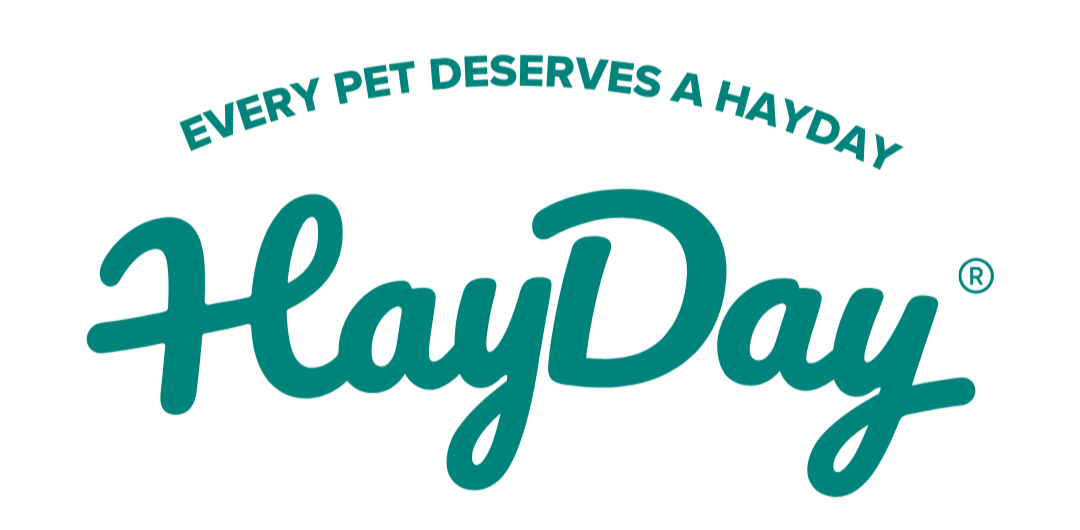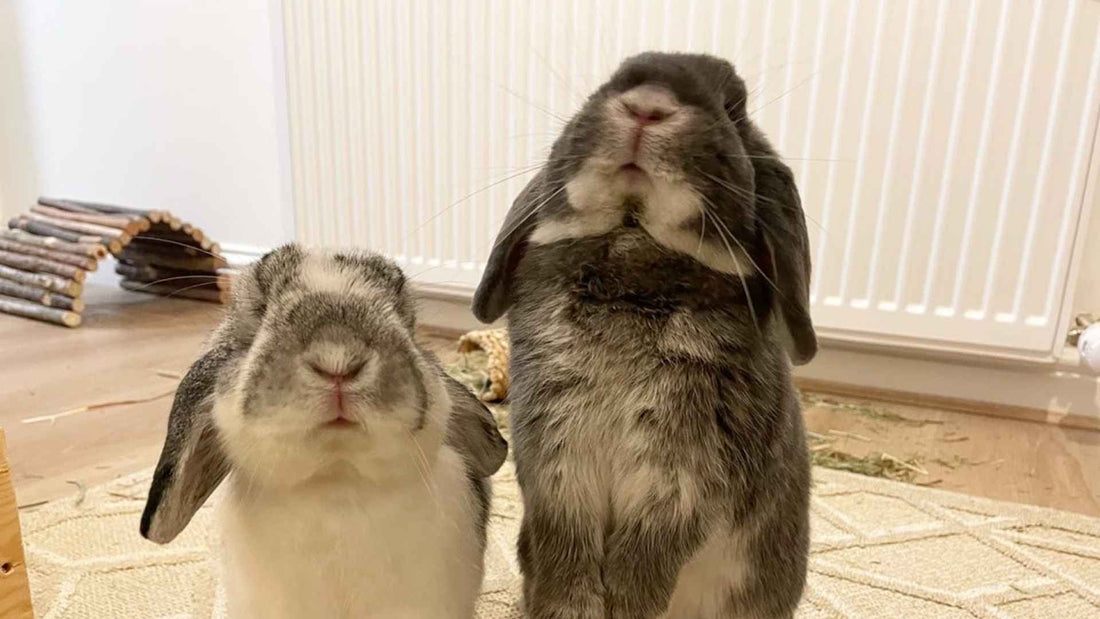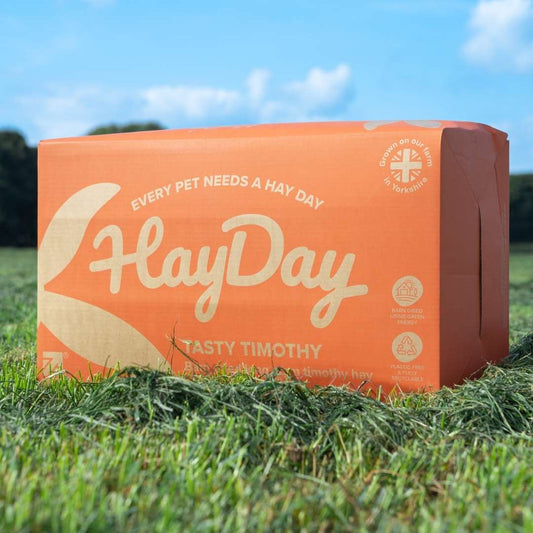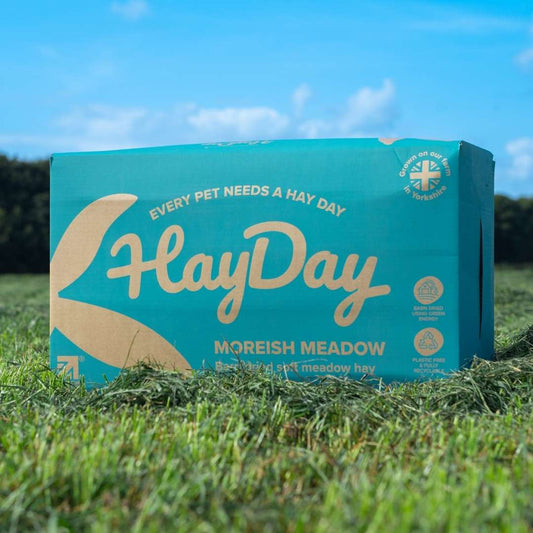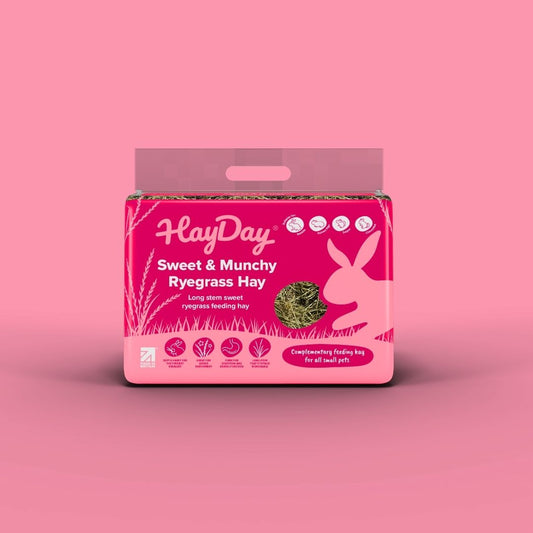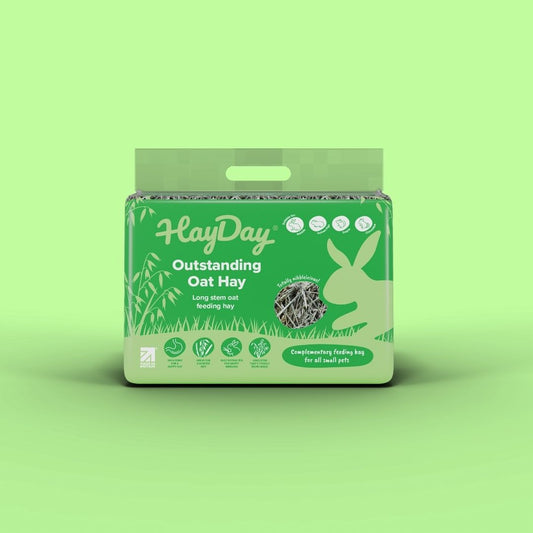Are Rabbit Pellets Any Good? A Complete Guide to Rabbit Nutrition
Here at HayDay, we've taken the time to answer a question we get asked A LOT - Are rabbit pellets any good?
While rabbit pellets can offer essential nutrients, they should complement and not replace; hay, leafy greens, and vegetables in your rabbit’s diet.
We've taken the time to explore the key benefits and any limitations of rabbit pellets, how much to feed them plus our top rabbit diet tips.
Shop Now > Premium quality hay for rabbits.
Feeding Rabbit Pellets Overview
-
Rabbit pellets are a supplement to a rabbit’s diet, providing essential nutrients but should not replace fresh hay and vegetables.
-
Premium quality hay should represent the majority of your rabbit's diet, with any pellets complimenting this.
-
A balanced diet for rabbits should consist of approximately 80 to 90% high-quality rabbit hay, 5 to 10% pellets and 5 to 10% leafy greens and vegetables.
What are Rabbit Pellets?
Rabbit pellets are specifically formulated to meet the unique dietary needs of pet rabbits.
This small, pelleted feed provides a balanced supply of essential nutrients that support a rabbit’s health and well-being.
High-quality rabbit pellets should contain a mix of vitamins, minerals, and fibre—all necessary for a rabbit’s overall health. The right blend can significantly contribute to your pet rabbit’s health and wellness.
Are Rabbit Pellets Good or Bad?
Rabbit pellets are akin to processed food for humans—convenient and nutritionally adequate but lacking the richness of fresh foods. While they provide essential nutrients, they shouldn’t replace the variety and fibre found in hay, leafy greens, and vegetables.
Think of pellets as a supplement to fresh foods rather than the main component of a rabbit’s diet.
Nutritional Value of Rabbit Pellets
High-quality rabbit pellets are formulated to include a balance of crude protein, fat, fibre, and calcium. This balance supports a rabbit’s overall health.
Types of Rabbit Pellets
There are two primary types of rabbit pellets: compressed or cold-pressed pellets and extruded.
-
Compressed or Cold-pressed pellets are made at lower temperatures (compressed) or formed under pressure without heat (cold-pressed), helping to preserve naturally occurring heat-sensitive nutrients.
-
Extruded pellets are produced using high temperatures and pressure, which can affect digestibility and the retention of naturally occurring and added nutrients. However, this is accounted for by adjusting the formulation to maintain nutritional value. Their uniform texture encourages slow chewing, promoting digestion.
All are appropriate options but you may find your rabbit shows a preference to a certain format based on texture.
Do Rabbits Need Pellets?
Pellets offer essential nutrients that might not be sufficiently available in hay and veggies alone. However, they shouldn’t be the sole component of a rabbit’s diet.
Balancing Diet with Hay and Veggies
A rabbit’s diet should primarily consist of hay, which they require for proper digestion. Grass hay, such as timothy hay, provides the high fibre content necessary for maintaining digestive health. Fresh greens and vegetables also play a significant role, adding essential nutrients that complement the hay.
While rabbit pellets provide a source of vitamins and minerals, they should be offered in limited amounts.
Potential Health Issues from Overfeeding Pellets
Overfeeding pellets can lead to weight gain and various health problems in rabbits. It’s recommended that pellets make up only about 5% of a rabbit’s diet. This proportion helps prevent issues like obesity and gastrointestinal stasis, ensuring that hay remains the primary sources of fibre to help digestion.
Measured amounts of pellets are recommended as excessive pellet consumption can lead to digestive disturbances and imbalances in gut bacteria and over time, weight gain, ultimately affecting a rabbit’s overall health.
How to Choose Quality Rabbit Pellets
Choosing high-quality rabbit pellets is essential for maintaining your rabbit’s health. Always look for pellets that are based on key fibre ingredients like grass such as timothy, grass or alfalfa meal, which provide essential nutrients.
Key Ingredients to Look For
When selecting the best rabbit pellets, it is always best to choose products that do not contain harmful additives or excessive sugars.
Young rabbits benefit from a diet rich in protein and calcium, supported by alfalfa pellets or meal and hay. As rabbits age, their dietary needs shift, and they may require specialised nuggets that cater to their lower activity levels.
Reading the labels of rabbit pellets ensures they meet your rabbit's nutritional needs. High-quality pellets contribute significantly to your rabbit’s overall health and well-being, avoiding ingredients that could be harmful.
Look out for high quality fibre ingredients such as alfalfa meal, grass meal and oatfeed (in order of highest to lowest calorie and protein content).
Foods to Avoid in a Rabbit's Diet
Certain foods can be harmful or even toxic to rabbits. Here are some foods to avoid:
-
Fruits’ seeds and pits (e.g. apple seeds)
-
Raw allium vegetables like onions and garlic
-
Avocados
-
Mushrooms
-
Raw potatoes
-
Processed foods like bread and chips
Other Harmful Foods
Foods that should be avoided for a rabbit’s digestive health include:
-
Seeds
-
Nuts
-
Large Amounts of Dried fruits
-
Animal proteins
It is so important to avoid these harmful foods to ensure your rabbit remains healthy and happy.
Feeding Guidelines for Different Life Stages
Rabbits require different diets based on their life stages. Young rabbits (up to 6 months) need higher protein and calcium for growth, adults need a high-fibre diet to maintain health, and seniors may require softer foods and dietary adjustments.
Tailoring the diet to the rabbit’s life stage ensures they receive the necessary nutrition for their age.
Baby Rabbits
Young rabbits require a diet higher in protein for health and development. Alfalfa hay is beneficial due to its higher calcium and protein content. Consistency in the diet is so important for baby rabbits as their sensitive digestive systems can be easily upset by sudden changes.
Introducing alfalfa pellets (or a suitable growing/junior rabbit pellet) gradually and monitoring their intake helps ensure they get the right nutrients without overwhelming their digestive system. Maintaining a consistent and balanced diet is key during their early stages.
Adult Rabbits
Adult rabbits need a diet rich in fibre, primarily sourced from hay. This high-fibre diet helps maintain digestive health and prevent dental problems. Hay should make up about 80 to 90% of their intake, ensuring they receive enough fibre to support their digestive system and overall health.
Senior Rabbits
As rabbits age, their dietary needs may shift. Senior rabbits often require adjustments in their diet to accommodate their changing health. Softer hay types such as meadow hay can help manage age-related conditions and ensure they remain healthy in their senior years.
Ensuring Digestive Health
Digestive health is paramount for rabbits. Avoiding human foods is crucial as these can cause significant health issues. Sudden dietary changes should also be avoided to prevent digestive upset - any changes to your pets diet should be done gradually, over a period of 7 to 14 days.
Maintaining a stable and balanced diet ensures your rabbit’s digestive system remains healthy.
Importance of Fibre Content
Fibre plays a vital role in maintaining a rabbit’s digestive health. It helps prevent any digestive issues and supports the proper functioning of the gut microbiota. A diet low in fibre can lead to obesity and gastrointestinal problems, highlighting the importance of a high-fibre diet. Pellets should contain a minimum crude fibre content of 16-18% to support digestive health.
Over-reliance on pellets can also result in dental disease and digestive complications. Ensuring that fibre from hay and fresh greens are the main component of the diet helps maintain a healthy digestive system and prevents obesity.
Hydration and Fresh Water Access
Rabbits require constant access to fresh water. Inadequate hydration can lead to serious health issues, including dehydration, which can significantly affect a rabbit’s overall health.
Always ensure your rabbit has an unlimited supply of clean and fresh water.
Recommendations for Rabbit Diets
Rabbit nutritionists generally recommend that a rabbits diet should consist of around:
-
80 to 90% hay
-
5 to 10% leafy greens
-
And 5 to 10 % pellets - high quality pellets should include natural ingredients without artificial colouring or preservatives.
Additionally, rabbits must have constant access to clean, fresh water to avoid dehydration and aid digestion.
Summary
In summary, rabbit pellets can be a valuable part of a rabbit’s diet, providing essential nutrients that may not be sufficiently available in hay and veggies alone. However, they should not be the main component of the diet.
A balanced diet rich in hay, fresh greens, and controlled pellet portions is essential for maintaining a rabbit’s health and preventing digestive issues.
By following these guidelines, you can help your rabbit live a long, healthy, and happy life.
Frequently Asked Questions
How much of a rabbit's diet should be made up of pellets?
Your rabbit's diet should only consist of about 5% pellets—aim for around 80 to 90% hay and 10% fresh greens to keep them healthy and happy!
What are the best ingredients to look for in rabbit pellets?
The best ingredients in rabbit pellets are timothy hay for essential fibre, along with a balanced mix of vitamins and minerals. Make sure to steer clear of any harmful additives or high sugar content!
Can muesli mixes be part of a rabbit's diet?
Muesli mixes aren't a good choice for rabbits because they can lead to selective feeding and nutritional problems. Stick to high-fibre pellets for a healthier diet.
What should I avoid feeding my rabbit?
You should definitely steer clear of fruits' seeds and pits, raw allium vegetables, avocados, mushrooms, raw potatoes, and any processed foods, as these can harm your rabbit's health. Keeping their diet safe and natural is key to their well-being!
How can I ensure my rabbit stays hydrated?
To keep your rabbit properly hydrated, always provide access to clean, fresh water and check it regularly to ensure it's full. Staying proactive about their hydration supports their digestion and overall health.
Relevant Links
Best Types of Hay for Small Animals
